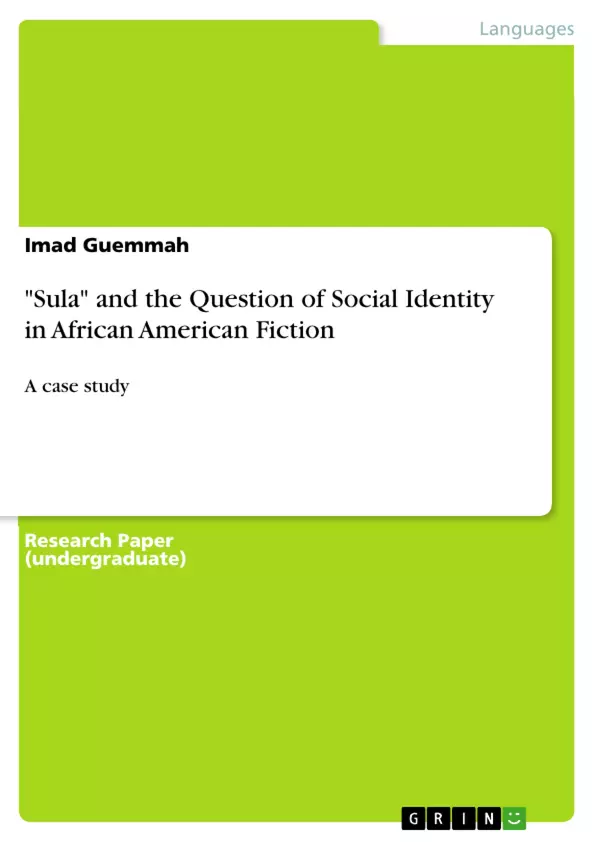The paper approaches an exploration of two major themes in Sula: social identity and gender subalternity. I would begin with an overview of the major points that mark the novel, and then shift to violently serious disagreements that bore reference to the submissive, subaltern position that Sula had to encounter. It is common sense to assume a certain Manichean worldview, for societies are bound to declare unorthodox conduct as persona non grata. This will pave the way for questing a priori justifications to the meaning of reality and illusion. Afterwards, I will emphasize the social, racial and psychological facets of resistance and representation, which portray oppressing challenges within society. These result in clear-cut demarcations, which in the event of being drawn, ontological questions germane to identity prove primordial. Next, I am highlighting philosophical explanations of self and other based on two critical angles: androcentrism (i.e. David Hume, Emanuel Kant and Durkheim) and feminism (i.e. Julia Kristeva and Simone de Beauvoir). I am eventually positioning the debate on the narrative platform, as being an arena of tension between central self and peripheral other. The analysis is held from a postmodern perspective. I would therefore attempt to build a bridge between the discourse of Morrison, who is addressing her message in the name of Sula, and that of postmodernism, which is a deviation from representation and a turn towards self-reflexiveness.
Inhaltsverzeichnis (Table of Contents)
- Toni Morrison's "Sula" as a case study
- On Sula's Identity and Subalternity
- Sula as a subaltern other
- Sula as the uncanny and the evocation of the other
- Resistance and experience: Do they influence social conduct?
- Making a difference: Selfhood impact on ideology power and convention praxis in the novel.
- Conclusion
Zielsetzung und Themenschwerpunkte (Objectives and Key Themes)
This paper explores the themes of social identity and gender subalternity in Toni Morrison's novel "Sula." It analyzes the protagonist, Sula, as a subaltern figure who challenges societal norms and expectations. The paper examines how Sula's experiences of resistance and her unique identity shape her interactions with others and the broader social context.
- Social identity and its construction in a broken society
- Gender subalternity and the challenges faced by women
- The power of resistance and experience in shaping individual and collective identities
- The role of postmodernism in understanding social and cultural dynamics
- The complexities of representation and the struggle for self-definition
Zusammenfassung der Kapitel (Chapter Summaries)
The first chapter introduces the story of Sula and her best friend, Nel, highlighting their contrasting backgrounds and the impact of a tragic accident on their relationship. The second chapter delves deeper into Sula's identity as a subaltern figure, exploring her defiance of societal expectations and the psychological implications of her actions. It analyzes how Sula's experiences of resistance and her unique perspective challenge the dominant narrative of the community.
Schlüsselwörter (Keywords)
The primary keywords and focus topics of the text include: social identity, gender subalternity, Sula, Toni Morrison, resistance, experience, postmodernism, representation, feminism, machismo, Manichean, identity, other, evil, providence, subaltern, uncanny, and the concept of self/other.
Frequently Asked Questions
What are the main themes explored in Toni Morrison's "Sula"?
The paper focuses on social identity and gender subalternity, examining how the protagonist challenges societal norms and expectations.
What does it mean to describe Sula as a "subaltern" figure?
As a subaltern, Sula occupies a marginalized, submissive position in society, representing the "other" who resists conventional social conduct and ideologies.
How does the concept of "self and other" apply to the novel?
The analysis uses philosophical angles like androcentrism (Kant, Hume) and feminism (Kristeva, de Beauvoir) to highlight the tension between the central "self" and the peripheral "other."
How does postmodernism relate to the analysis of "Sula"?
The paper builds a bridge between Morrison's narrative and postmodernism, viewing the text as a deviation from traditional representation and a turn towards self-reflexiveness.
What role does resistance play in Sula's identity?
Sula's resistance against societal conventions and the "Manichean" worldview of her community is primordial in defining her unique social and psychological identity.
- Quote paper
- Imad Guemmah (Author), 2010, "Sula" and the Question of Social Identity in African American Fiction, Munich, GRIN Verlag, https://www.grin.com/document/275862



